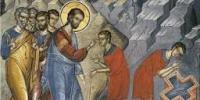
Today’s gospel is a drama, with a rich cast of characters through whom John skilfully explores how Jesus, a devout Jew, contrasts a God of compassion with the self-sastisfied Pharisees. The curing of the blind man took place at the Festival of Tabernacles, when Jesus was in Jerusalem. The Pharisees were becoming increasingly hostile to him, both to what he was doing and who he was claiming to be. They had no sympathy for the man born blind, smugly casting him aside as a sinner who deserved his fate. All they were concerned about was the violation of the Sabbath.
It was generally assumed that suffering came as a punishment for sin, and that it was therefore obvious that the man or his parents had sinned. There is no evidence that God inflicts suffering for wrong doing. It is true that sin brings suffering but good people often endure the most terrible pain or hardship. However, in order to preserve their privileged status, the Pharisees were determined to prove that not only the blind man but Jesus were sinners.
John makes an ironic contrast between the Jewish leaders and the blind man. He realises something wonderful has happened to him, since no one has been healed before who was blind from birth. This has given him a strong faith, which - metaphorically as well as physically - has opened his eyes. On the other hand, the learned people he boldly confronts are now the ones who are blind. They eject him from the temple, which could mean the same ostracisation as meted out to lepers. However he is accepted by Jesus and worships him. He is all he needs.